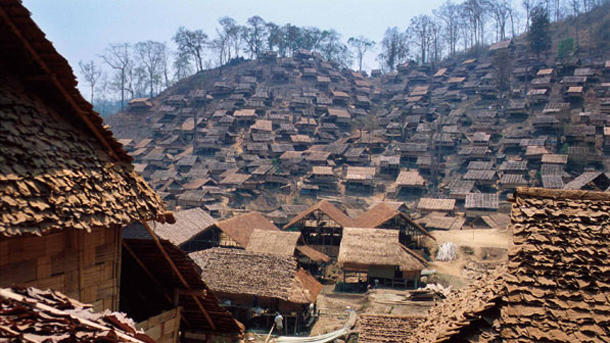World Refugee Day is a Timely Reminder that the Rights of Refugees Must Be Respected
By Burma Partnership • June 23, 2014 The Royal Thai Army’s Internal Security Operations Command (ISOC) last week requested, at short notice, to meet with representatives of the UN High Commissioner for Refugees (UNHCR) and local NGOs to discuss how refugees from Burma currently living in various camps along the Thai-Burma border can be repatriated in the near future. It is notable, however, that while regional military commanders were present at these meetings, no representatives from the refugee camps themselves or from community-based organizations (CBOs) assisting them were invited. The obvious and disturbing implication is that a decision on the status of refugees inside Thailand is likely to be made in the very near future with minimal consultation with affected parties. Moreover, the timing is not just premature and ill-considered, it is bitterly ironic given that last Friday, 20 June, was #WorldRefugeeDay.
The Royal Thai Army’s Internal Security Operations Command (ISOC) last week requested, at short notice, to meet with representatives of the UN High Commissioner for Refugees (UNHCR) and local NGOs to discuss how refugees from Burma currently living in various camps along the Thai-Burma border can be repatriated in the near future. It is notable, however, that while regional military commanders were present at these meetings, no representatives from the refugee camps themselves or from community-based organizations (CBOs) assisting them were invited. The obvious and disturbing implication is that a decision on the status of refugees inside Thailand is likely to be made in the very near future with minimal consultation with affected parties. Moreover, the timing is not just premature and ill-considered, it is bitterly ironic given that last Friday, 20 June, was #WorldRefugeeDay.
We call upon all parties to respect the UN 1951 Convention and 1967 Protocol Relating to the Status of Refugees, which represents international law as regards the rights of refugees, and is at the very least morally persuasive if not legally binding on the parties concerned. We also call upon all parties to include representatives of the refugee camps and of CBOs in any future meetings on the status of refugees or their potential repatriation. Furthermore, we urge all parties to ensure that repatriation of refugees only takes place when circumstances are appropriate, it is genuinely safe to return, all refugees’ rights are guaranteed by the Burma government, and that, most importantly, such repatriation is completely voluntary.
Such assurances as might be made are unlikely to mean much until all ethnic groups in Burma have their rights preserved under an amended Burma Constitution, until they are granted proper self-determination and an equitable share of Burma’s economic development, until all land mines are cleared and people’s security guaranteed, and until violence and human rights abuses are halted against Burma’s beleaguered ethnic communities. While the Burma Army continues to wage war against the Kachin people, other ethnic communities such as the Karen are unlikely to feel that it is safe enough to return, while the increased militarization and economic acquisition occurring in Karen State only serves to further disenfranchise refugees.
We also call upon the wider international community – including the UNHCR – to apply necessary pressure on relevant authorities to ensure that the rights of refugees are prioritized and protected. We urge the Association of Southeast Asian Nations (ASEAN) to become more vocal, and to take necessary political and economic measures to encourage all parties to respect international law, for refugees are nothing if not a regional issue.
The risks of doing nothing are obvious, and Karen Women’s Organization’s (KWO) Letter of Appeal on #WorldRefugeeDay paints a painfully clear picture of what is at stake: “Refugees have positions and opinions regarding their return that need to be respected. Whenever the question is raised to the refugees, ‘when do you want to return?’ the refugees answer that they will return when the politics in Burma is stable and sustainable, their safety is guaranteed, and there is justice for all. The process of preparing and planning the return of refugees should only be done with the full, genuine and well-informed involvement of individual refugees and the wider refugee community. Our rights should be respected and our input valued. Refugees are human beings just like everyone else. We hope the Karen, and other ethnic groups in Burma, and IDPs, receive freedom to live, as ordinary citizens, in Burma, with dignity, equality and peace.”
Tags: Burma Partnership, Karen women's Organization, Refugees, Royal Thai Army Internal Security Operations Command, UNHCR, World Refugee DayThis post is in: Blog
Related PostsBurma Partnership Celebrates Continuing Regional Solidarity for Burma and Embraces the Work Ahead for Progressive Voice
Burma Army Displays Blatant Disregard for 21st Century Panglong Peace Process
Ann Din Coal Power Plant: Local Movement and Action to Preserve and Protect Natural Resources and Land: Mon IDP Report Case Study #4
Latest Human Rights Abuse Case Demonstrates Urgent Need to Reform the Myanmar National Human Rights Commission
Human Rights Far From Guaranteed as US Sanctions on Burma Are Removed









 All posts
All posts